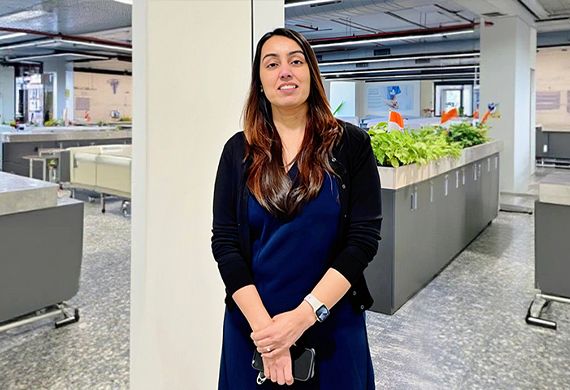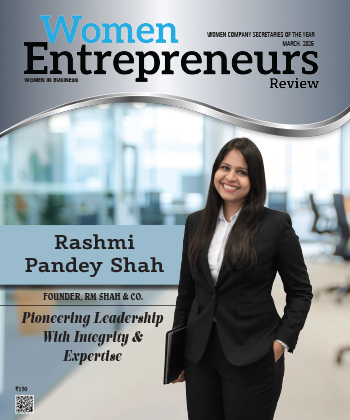
Bridging Gaps in Medical Affairs for Women's Growth
By: Anudeep Sandhu, Director, Medical & Clinical Affairs, Terumo India
Anudeep drives strategic initiatives at Terumo India, ensuring compliance with business and regulatory standards. With 15+ years of expertise in medical affairs across rare diseases, neurology, and hematology, she also leads the Terumo India Skill Lab, fostering innovation and professional development in healthcare.
In an insightful interaction with Women Entrepreneurs Review Magazine, Anudeep shares her insights on balancing rapid innovation with ethical responsibility in medical affairs, driving organizational growth amidst systemic challenges for women leaders, and leveraging digital transformation to enhance healthcare access and inclusivity.
In the evolving healthcare landscape, how can medical affairs leaders balance rapid innovation with ethical responsibility while ensuring emerging markets benefit equitably from medical advancements?
Innovation must be accessible. As a medical affairs leader, I believe our role goes beyond innovation; we contribute to society through healthcare by ensuring medical progress reaches the right patient at the right time leading to better patient care and quality of life. The challenge isn’t just developing cutting-edge solutions; it’s ensuring they are effective, safe and accessible. That’s where ethical responsibility comes in.
At Terumo India, we are committed to empowering healthcare professionals through education and hands-on training. The Terumo India Skill Lab (TISL) plays a crucial role in this by providing doctors with a real-world simulation environment to refine their skills and adopt minimally invasive techniques. By collaborating with clinicians, academic institutes and industry associations, we make sure we support upskilling of HCPs to use innovative technologies to offer an improved standard of care to patients.
What unconventional leadership strategies have you found most effective in driving organizational growth, particularly in environments where women leaders still face systemic challenges?
One of the most impactful leadership strategies I have embraced is shifting from mentorship to sponsorship, actively creating real opportunities for women and being a sponsor by providing platforms to be visible and showcase their contribution provides the necessary acceleration.
Leadership thrives on collaboration and inclusivity. Encouraging a culture of shared leadership drawing in diverse perspectives to enable strategic decisions can be instrumental in driving organizational growth. Identifying systemic challenges and consciously tackling them by ensuring equal access to growth opportunities benefits not just women but the entire organization. Real change happens when we move beyond intent and take bold, deliberate actions to support and elevate women in leadership.
How can digital transformation in medical affairs be leveraged to create more inclusive opportunities for women professionals while also improving healthcare access in underserved markets?
In underserved markets, digital platforms are a game changer. Accessibility to information and knowledge on the latest techniques at a click of a button helps healthcare providers to remain updated and adopt minimally invasive techniques, ultimately improving patient care. With innovative training methods, medical professionals, especially women, can upskill on their own terms, gain hands-on experience, and step into more impactful roles. Creating a stronger, more inclusive healthcare system where expertise knows no boundaries requires deliberate action and equitable access to opportunities to upskill and learn.
Digital transformation in medical affairs is creating inclusive opportunities for women professionals by breaking geographical barriers to learning and leadership. With simulation-based training and virtual education platforms, professionals can enhance their skills and expertise at their own pace. Hands-on learning environments replicate real-world procedures, ensuring that physicians across all regions have access to advanced medical education.
How do you redefine people-centric leadership in high-stakes, data-driven healthcare environments to enhance both productivity and well-being, especially for women professionals?
We need to understand how data-driven healthcare is impacting care delivery and patient experience. Women form a significant portion of the healthcare workforce. Data driven healthcare is not only about identifying the right opportunities for innovation and to improvement in patientcare but also about wellbeing of the workforce that drives this innovation and delivers care.
True leadership means blending technology with empathy, ensuring professionals feel supported, valued, and equipped to succeed. For women in healthcare, this means more than just opportunities. Whether its access to skill building, leadership training, flexible policies for work-life balance, or strong mentorship and sponsorship, and the goal is clear empowerment of women to step into senior roles and drive a larger impact without sacrificing well-being.
Given the rapid shifts in medical affairs, what personal strategies have helped you stay ahead of industry transformations, and how do you inspire women leaders to embrace continuous learning?
Staying ahead in medical affairs isn’t just about keeping up; it’s about constantly evolving, adapting, and adopting a patient centric approach. That’s why I stay deeply connected to global healthcare trends, and embrace digital advancements. Collaboration and exchange of ideas with industry and clinical experts ensures we’re always at the forefront of advancing healthcare with the patient at the center.
Through initiatives like TISL, we cultivate a learning ecosystem, enabling professionals to translate knowledge into impactful patient care. Creating spaces where learning can happen in a safe environment means better patient care, stronger teams, and a more resilient, future-ready workforce. Adopting a culture of lifelong learning is critical for professionals, especially women, and enabled by access to mentorship, equal opportunity, leadership programs, and hands-on training, they don’t just grow; they shape the future of healthcare.
Most Viewed
- 1 Women's Health Startup HerMD Closing Doors Amid Industry Challenges
- 2 5 Famous Women in Indian Armed Forces
- 3 Saudi Women No longer Require Male Permission for Clothing Choices, says Prince MbS
- 4 Kolkata Medtech Startup Innovodigm Raises Rs 5.5 Crore Seed Funding Led by IAN Group
- 5 Yamunanagar's Kashish Kalra Honoured after Securing 111th Rank in UPSC Civil Services Exam
- 6 Madurai Appoints Its First Woman Corporation Head
- 7 IAS Vijayalakshmi Bidari Appointed as the new Nagpur Divisional Commissioner
- 8 American Entrepreneur Lucy Guo Overtakes T Swift to become Youngest Female Billionaire
- 9 ICC Women's World Cup 2025 Trophy Showcased at Indore's Holkar Stadium
- 10 Aparna Saxena's Beauty Venture AntiNorm Launches in India
- 11 Vidya Nataraj Co-Founded BlueStone Jewellery & Lifestyle files IPO
- 12 5 Women Freedom Fighters of India
- 13 Dr. G Krishnapriya appointed as CEO for Trichy
- 14 M3M & Sirona Partner to Introduce Menstrual Hygiene Vending Machines in 15 Locations
- 15 Punjab Govt launches SHE Cohort 3.0 Supporting Tech-led Women Startups
- 16 Indian origin Lawyer, Sweena Pannu appointed as the US New Superior Court Judge
- 17 The Aurora Tech Award recognizes 4 Indian Women-led Startups
- 18 Kerala's Republic Day parade featured an all-female tableau
- 19 Manisha Kabbur Becomes Karnataka's First Woman International Karate Coach
- 20 Director K. S. Ravikumar's Daughter Maalica Ravikumar Launches Life Coaching Company 'Evergrowth Academy' for Women
- 21 Leezu's Raises Pre-Seed Funding to Accelerate Growth in Sexual Wellness Industry
- 22 Sattu: Super-easy summer drink for PCOS gut healing
- 23 Swathi Nelabhatla creates Sitha App, India's First Women-Exclusive Gig Platform
- 24 7 Timeless Female Kathak Dancers & their Iconic Legacies
- 25 Meet 7 Iconic Women Architects of Modern India & their Most Impactful Work
- 26 This Woman-led Insuretech Startup is Helping Bridge the Education Financing Gap in India
- 27 Women Leaders Share Lessons Learnt from India Women's WC Win
- 28 5 Enterprising Women Founders Powering Singapore's Tech & Innovation Landscape
- 29 4 Women. 4 Stories. One Vision for Smarter, Stronger Healthcare
- 30 Global Gender Gap Narrows to 68.8%, But Full Equality 123 Years Away: WEF Report 2025
- 31 Changemakers: 7 Women Entrepreneurs Taking the Make in India Movement Forward
- 32 Meet Lucy Guo, The Youngest Self-Made Female Billionaire Disrupting Tech
- 33 How Women are Driving India's Festive Online Shopping Surge






